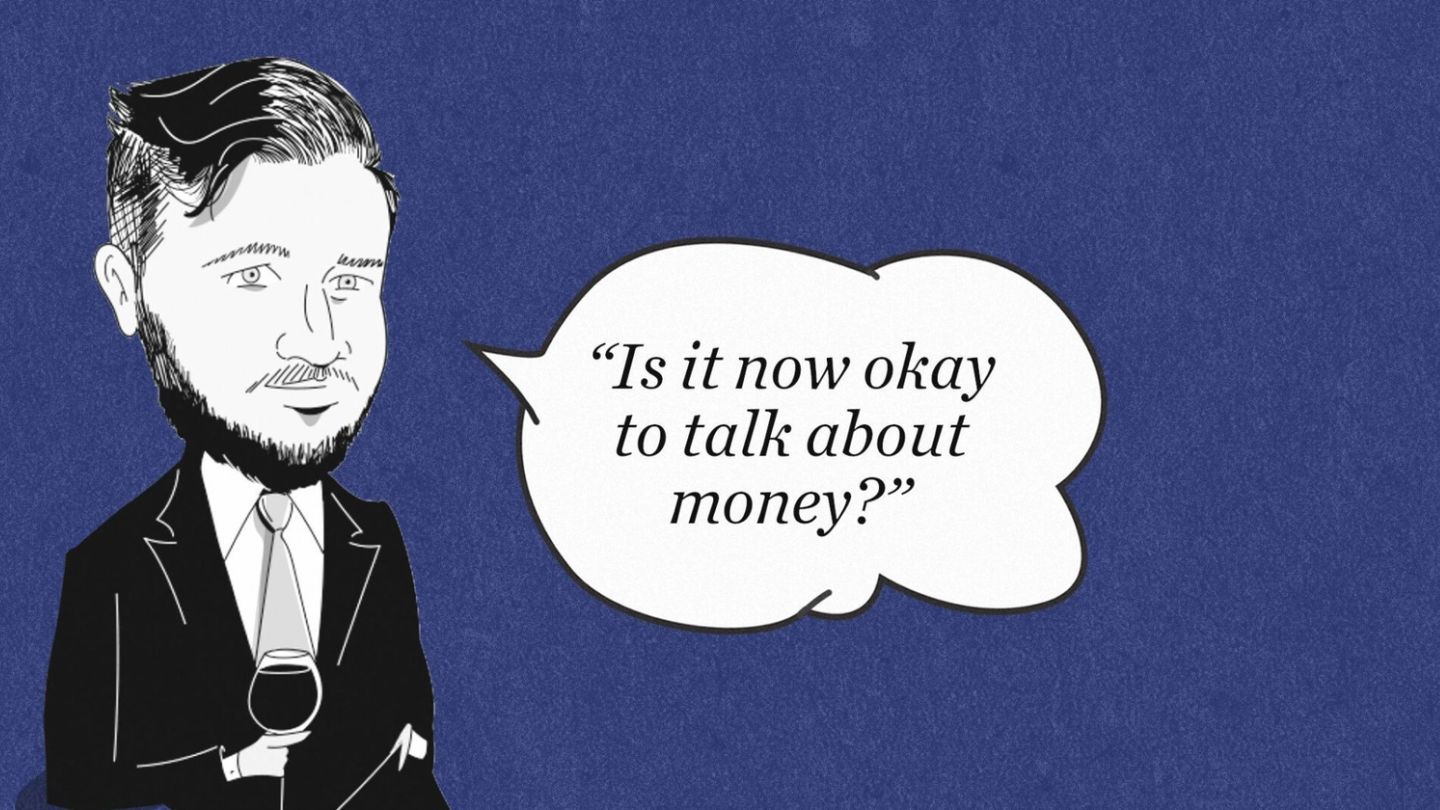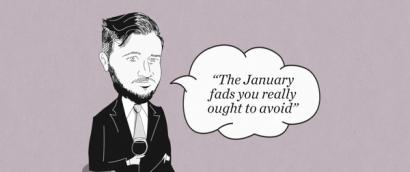

The Blind Spot: Is it now okay to talk about money?
Like politics, religion or sex, money's a subject a gentleman just doesn't bring up. But is it time we started to discuss the gory details?
Words: Joseph Bullmore
“How much money do you make?” says Jonah Hill to Leonardo DiCaprio when he first meets him in a diner in The Wolf of Wall Street. “You show me a pay stub for $72,000 dollars and I quit my job right now and I work for you.” (This is just before the bit with all the girls and cocaine and just after the bit with all the girls and cocaine).
You’ve often wanted to ask people that question yourself, haven’t you. Not because you want to work for them (other people’s jobs are really boring) — but because you want to work out how they have what they have.
Usually the answers are pretty straightforward. How do you own this beautiful Holland Park maisonette? (My dad bought it); How do you have such good teeth? (My dad bought them); How do you have such a lovely girlfriend? (We met in Freshers’ week and bonded over Tinie Tempah and my terrible dancing. And then my dad bought me a helicopter).
But we don’t ask these questions, because for an Englishman it’s just not The Done Thing. I go red at the thought of my own bank balance, let alone other people’s. And don’t get me started on the people that owe me historic debts (for a period at Durham I ran quite a successful bookmaker — pooled bets on the best abs at the University Fashion Show; sweepstakes on the first frost of Autumn. Simpler times). I’d rather die than prod any of my debtees to pony up the cash.
Now, though, the tides are turning. Salary transparency is all the rage. Openness breeds equality — and equality is super popular. But when is it okay to discuss the gory details? And when is money better left unmentioned?
It’s fine to discuss money…
…if you’re in a job interview, , A job interview is not the time to be self-effacing. While humility and modesty are admirable traits when talking about your successes, it’s still important to talk about them.
The same goes for money. Most of us are reticent to say just how much money we’d expect if we were to get the job in question. This allows the employer to get their lowball figure on the table first, anchoring all future negotiations to a number advantageous to them.
Have a figure in your head, and say it in plain and clear language — don’t even couch it in “something in the region of” vagueness or by sliding a piece of paper with a figure on it across the table. I’m pretty sure you’re not in the mafia.
…if you’re in the North
The North is a place that starts just beyond Oxfordshire and stretches up pretty much all the way to the Arctic circle. There are polar bears there, and a supermarket chain called Booths, and arguments over cakes. But there’s also a sense of ease and openness that Southerners would never countenance.
My colleagues from the North (Kendall and Yarm — their hometowns, not their names) tell me that there’s little taboo around discussing salaries and pay rises in this part of the country, and that it’s not uncommon to know what all your friends and colleagues take home after tax. When in Yarm, do as the Yarmans do.
… if you’re among Americans
Vernon Hill III, the tycoon founder of Metro Bank and a recent guest on our podcast, once told me that the biggest difference between British and American entrepreneurs was their attitude to money.
Vernon believes that our Anglo Saxon reticence to discuss the gory details so often holds us back. This is true in negotiation scenarios, yes — but also in the way that it dampens our entrepreneurial instincts. Comparing salaries, wealth and bonuses is essentially competitive, and to remove that element of competition is to blunt our hunger and ambition.
Americans know this instinctively — their constitution proudly hymns the importance of wealth and the pursuit of happiness (read: the opportunity to earn more than your neighbour). Last time I was in New York I was asked, with a rather roundabout deference to our English shyness, “how much money a print journalist might take home these days”. I wasn’t offended, and I actually slightly enjoyed the Patrick Bateman-esque social profiling. (I ducked the question anyway).
… if you’re in an ultra modern start up
Buffer, the incredibly successful social media scheduling start up, decided to make absolutely all of its salary information transparent in late 2013 — not just internally, but externally too.
The company has since become a prime example of the benefits of talking openly about money — it’s grown from 12 employees to more than 80 in just a few short years, and claims some of the highest employee satisfaction rates in Silicon Valley.
Buffer even publishes a salary formula each year, which takes into account a variety of factors from experience and loyalty to job title and stock options. “When you have really firm reasons why someone is being paid something, it makes people more comfortable” says Hailley Griffis, Buffer’s PR manager.
Since then, hundreds of start ups have dismissed the omertà over salaries, to the general satisfaction of their employees and shareholders. It didn’t go particularly well for the BBC, but then that’s exactly why they should have done it far sooner — to expose those monstrous pay chasms before they grew even wider. (Gary Lineker’s a good egg, but wow.)
It’s not okay to discuss money….
…if you’re on a date
I mean, obviously. In many ways, the date dynamic is the mathematical opposite of the interview scenario. You’re not trying to impress on her how great you are — you’re trying to gently remind her how great she is. (Not in an “I love you, you’re so beautiful, my mother and you would get on so well” sort of way, I should say — been there, done that, very little t-shirt involved.)
Talking about your salary, or asking about hers, will carpet bomb this subtle dynamic. It stinks of one-upmanship, and shallowness, and poor manners, and rank insecurity. (It’ll also make the unease of the ‘bill please’ moment even more acute). But you’ll mostly just sound like a dick.
…in almost every social setting
There’s a scene in When Harry Met Sally (not that one), where Harry tells Sally how attractive she is. Sally points out that now he’s said something like that, he can’t take it back — and that his directness has robbed him of the power of ambiguity.
In almost every single social scenario, ambiguity is the oil that greases the cogs. And there’s rarely anything ambiguous about money. Once you’ve blurted out your salary, or your bonus size, or how much you’ve inherited, you can not un-blurt it. It’s on the table. And people will do with it as they wish.
We’re not stupid. We all know that our friends in finance earn more than our friends in journalism (to pick a profession absolutely at random). But to point it out is to strip society’s cogs of their oil.
More importantly, the sheer showiness of it is unforgivably naff. (See also: most modern sports cars, all new-build mansions, having an indoor swimming pool, any bottle that comes with sparklers, going to Novikov.)
Need more answers to the questions no-one is asking? Why not find out if you’re sitting in Siberia?


